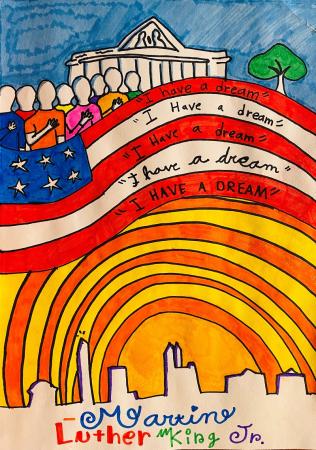But this is not an option. With lives on the line, we dare not surrender to futility. Instead, on this sacred day, dedicated to human rights, let us seek solace and wisdom from those who have traveled the path before us. Dr. King’s vision of hope was hewn out of a mountain of despair. And even Moses, the great liberator of the Hebrew Bible, experienced shattering dejection before leading his people out of Egypt. When he first promises to free the Israelites, they cannot hear his message of redemption, due to what Torah describes as kotzer ruach (Exodus 6:6-7). While the exact meaning of this phrase is open to interpretation, one prominent commentator understands it as a kind of spiritual impatience, suggesting that the Israelites briefly took heart but grew demoralized as the plagues wore on, failing to recognize that freedom does not blossom overnight. It’s a cautionary tale of how dashed expectations can quickly turn to despondency.
So how do we make our way through Idaho’s howling political wilderness toward our vison of the Promised Land? Alas, I have no sure roadmap for that journey. The best I can offer this afternoon is some modest advice gleaned from a couple of my favorite teachers: Moses and Motown. I’ve already introduced the former; we’ll approach the latter through three of the civil rights movement’s most influential anthems: Sam Cooke’s “A Change is Gonna Come”; Curtis Mayfield’s “People Get Ready”; and Martha and the Vandellas’ “Dancing in the Streets”.
**********
There been times that I thought I couldn't last for long
But now I think I'm able to carry on
It's been a long, a long time coming but I know
A change gonna come, oh yes it will.
-Sam Cook, "A Change is Gonna Come"
Through countless trials and tribulations, Moses recognized that the liberation journey would extend beyond his own lifetime. So he spent forty years preparing the next generation to cross the Jordan and died gazing on the plains of Canaan from afar. Echoing that experience, Dr. King spoke prophetically the night before his own death: “We’ve got some difficult days ahead. But it doesn’t matter to me now, because I’ve been to the mountaintop.” So, too, Sam Cooke was fatally shot two weeks before his classic, “A Change is Gonna Come” hit the airwaves. Like Moses and MLK, he reminds us that the pursuit of justice is a marathon, not a sprint. It’s a long time coming, he achingly acknowledges; there are no short cuts on the road to freedom.
We forget this wisdom at our peril. Too often, understandably hungry for immediate returns after decades of electoral losses, we expend copious time and money on big ticket races only to inevitably lose badly. Sam Cooke suggests that we are better off playing a long game, creating a justice campaign that grows from the grassroots up rather than trickling down from the halls of power. We need to think bigger than two-to-four-year political cycles. Instead of pouring millions of dollars into currently futile statewide races, we can build a movement starting with PTOs, school boards, county commissions, highway districts. Home by home, neighborhood by neighborhood.
Consider the example of Reclaim Idaho, whose strategy is straightforward: One campaign at a time, we seek to grow a movement of local leaders and volunteers with the power to demand change. It isn’t glamorous but it works. Year after year, our legislature refused to expand Medicaid even as countless Idahoans unnecessarily sickened, died, and fell deep into debt with medical expenses. So Reclaim Idaho campaigned tirelessly behind the scenes to create a ballot initiative, and in 2018, over 60% of Idahoans voted for Medicaid expansion. Here was hard evidence for a truth I think we all knew in our hearts: Idahoans are better than the extremists we elect to represent us. When we take the long way, making our case door by door, we can accomplish great things.
My colleague, Rabbi Sharon Kleinbaum, teaches that we generally overestimate how much we can realize in a year, but underestimate what we can achieve in ten. Another wise teacher, Wes Jackson, takes this principle even farther. Back in the early 1970s, he recognized that contemporary agriculture is fundamentally unsustainable and set out to develop a radically new agrarian practice. For the past five decades, he has toiled at that task, breeding new perennial hybrids to feed healthy human communities. A few years ago, a journalist asked him, “How long will it take before you succeed?” Jackson replied: “I believe we’ll find our answers within the next twenty-five years.”
The questioner followed up: “But you are well into your eighties! It seems extremely unlikely that you’ll live to see that day. Isn’t it terribly frustrating, to labor so long without witnessing the fruit of your efforts?”
Wes Jackson paused for a moment, then responded: “If your life’s work can be completed within your lifetime, you’re not thinking big enough.”
It's been a long, a long time coming, but I know a change gonna come
**********
People get ready there's a train a-coming
You don't need no baggage, you just get on board
All you need is faith to hear the diesels humming
Don't need no ticket--you just thank the Lord
-Curtis Mayfield, "People Get Ready"
Curtis Mayfield’s anthem, “People Get Ready” is a masterpiece in a long line of Black American hymns that invite the listener aboard the freedom train bound for a better world. While Mayfield pointedly denies admission to the truly malevolent who would “hurt all mankind just to save his own,” he emphasizes from start to finish that this railroad promises hope for everyone else. It’s picking up passengers from coast to coast, no baggage, no ticket required. You just get on board. That inclusive spirit of beloved community is the engine that drives the whole train down the tracks. We move forward only when—and because—we travel together.
Moses teaches the same lesson at a critical junction in his struggle with Pharaoh. With the plague of locusts devouring every growing thing in Egypt, Pharaoh’s courtiers persuade their boss to offer a compromise: he will let Moses, Aaron, and the Israelite men go and worship their God. But Moses knows better than to divide the people, whose strength lies in their unity. Without a moment’s hesitation he replies: We will all go together, young and old, with our sons and our daughters alike. Then, as now, our capacity to prevail depends upon our unbreakable solidarity.
Alas, too often in our contemporary human rights work, we create barriers and baggage, demanding that our fellow pilgrims pass litmus tests to earn their tickets to ride. Instead of working through our legitimate differences on assumptions and tactics, we divide into competing tribes, prioritizing ideological absolutism over consensus and compromise. In his essay, “Building Resilient Organizations: Toward Joy and Durable Power in a Time of Crisis,” activist Maurice Mitchell argues that to effectively combat rampant racist and authoritarian forces, we must nurture pragmatic partnerships. He warns against the kind of unyielding purity that holds anything less than the most idealistic position as a betrayal of core values and evidence of corruption or cowardice. How can we move forward, he asks, if we self-righteously refuse to engage with those who do not already share all our views and values?
If this cautionary note holds true for Maurice Mitchell, who lives in deep blue New York surrounded by progressive allies, all the more so for us here in Idaho, where we can scarcely afford to alienate potential coalition partners. In our environment, unity creates possibility; division spells doom. As with Moses and the ancient Israelites, our liberation journey depends upon our ability to travel together. We need to march side by side: vegans with hunters in support of wilderness; socialist academics with blue collar unions for fair wages; radical queer activists with mainstream libertarians for gay rights; liberal Democrats with moderate Republicans for open primaries; Jews and Muslims and atheists and liberal Christians against white fundamentalist nationalism. For as Dr. King reminded us: We may have come over on different ships, but we’re in the same boat now.
We are stronger together. You don’t need no ticket—you just get on board.
**********
Callin' out around the world
Are you ready for a brand new beat?
Summer's here and the time is right
For dancing in the streeets
-Martha Reeves and the Vandellas
Emma Goldman famously proclaimed: “If I can’t dance, I don’t want to be part of your revolution”; Martha Reeves and the Vandellas’ 1964 hit “Dancing in the Street” provides the groove. Legend has it that the song’s writers, Mickey Stevenson and Marvin Gaye were driving through the streets of Detroit when they saw children of different races playing and dancing in the water of an open-fire hydrant. That image of integration inspired the two men to create the song.
For the hard work of justice to endure, it must be suffused with joy. The night before the Israelites left Egypt, Moses declared a communal holiday, celebrating the Passover before it actually happened: This day shall be to you one of remembrance; you shall rejoice in it as a festival for all time. Though much hard labor lay both ahead and behind—though Pharaoh’s legions would soon be in furious pursuit—it was nonetheless essential to make time for gladness and thanksgiving.
In her article “Black Justice, Black Joy,” Lindsay Norward of the NAACP’s Legal Defense Fund writes:
For weeks following the horrific murder of George Floyd, protesters took to the streets. Brimming with passion and energy, the sounds of their despair and exhaustion at persistent injustices reverberated. At the same time, though, lively chants, speakers blasting protest anthems, rhythmic drumming, and joyous song saliently filled the air, harmonizing against the clash of tear gas and violence directed at them as they rallied for justice.
Within these sounds, despite and amid the pain, were expressions rooted in Black joy.
These simultaneous expressions of deep sorrow and hopeful elation are an enduring part of Black people’s present and past in the United States, existing in various forms throughout the long and winding fight for civil rights and racial equality. . . Voting rights foot soldiers in 1965 crooned “Freedom Songs” as they marched from Selma to Montgomery, Alabama, despite facing unspeakable violence and harassment from law enforcement. In sharing joy amid sorrow, Black people have not only challenged injustice with triumph —they’ve envisioned the unwritten and unseen within the future, imagining what could be possible.
Make no mistake: our demonstrations are deficient without dancing and graceless without gratitude. Even as we live amidst cruelty, suffering, and bigotry, let us remember that this world is also filled with beauty, courage, and delight. Without those precious stores to draw upon in times of trial, we would soon deplete ourselves of the holy energy we need to bend the arc toward justice. So look around this room. Celebrate the faces and look into the eyes of those who stand here, together, side by side, and smile. Take good pleasure in this soulful congregation of friends and strangers dedicated to the fulfillment of Dr. King’s dream. Savor the blessing—the unquenchable joy—of Cherie Buckner-Webb’s extraordinary voice and know: the time is right for dancing in the street!
**********
My friends, I believe that a change is gonna come. I don’t expect the work to be finished within my lifetime, but I know, with all my heart and soul, that one day this Capitol dome will ring with liberty and justice for all Idahoans.
So, people, get ready.
There’s work to be done.
Let’s dance.
https://www.youtube.com/watch?v=Z5zDRtEC0x0
https://www.youtube.com/watch?v=VOXmaSCt4ZE
https://www.youtube.com/watch?v=68Uv959QuCg




